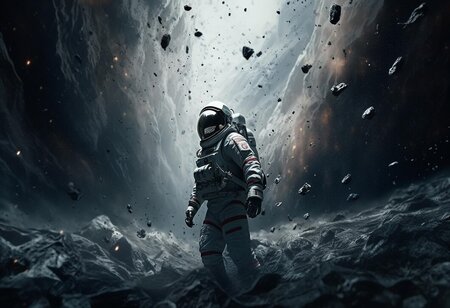Four Astronauts were Launched to The International Space Station by SpaceX
By Consultants Review Team
 Three American astronauts and one Russian cosmonaut were safely propelled into orbit by the SpaceX rocket, despite initial worries about a fracture in the side hatch that almost prevented the launch. NASA's SpaceX Crew-8 mission discovered an issue with a break in the side hatch before to the rocket launch. The crews decided to go ahead with the launch despite the crack being "too small" to be concerning. Elon Musk's SpaceX Dragon Mission rocket, which was designed to ferry humans to the International Space Station, successfully launched from Florida into orbit at 10:53 p.m.
Three American astronauts and one Russian cosmonaut were safely propelled into orbit by the SpaceX rocket, despite initial worries about a fracture in the side hatch that almost prevented the launch. NASA's SpaceX Crew-8 mission discovered an issue with a break in the side hatch before to the rocket launch. The crews decided to go ahead with the launch despite the crack being "too small" to be concerning. Elon Musk's SpaceX Dragon Mission rocket, which was designed to ferry humans to the International Space Station, successfully launched from Florida into orbit at 10:53 p.m.
"Dragon missions have launched more than 1,000 research experiments into orbit over the past 12 years, giving researchers the chance to fly critical science into orbit," SpaceX stated. Launched from Kennedy Space Center, Space X's Falcon rocket carried NASA's Matthew Dominick, Michael Barratt, and Jeanette Epps together with Alexander Grebenkin of Russia. Tuesday is when the astronauts should arrive to the orbiting lab. The crew from the United States, Denmark, Japan, and Russia who have been there since August will be replaced by them.
Test pilots for Boeing's new Starliner capsule are scheduled to arrive in late April. A tiny shuttle named Dream Chaser from Sierra Space is scheduled to arrive in a month or two and will bring goods to the station, but not people just yet. Before becoming an astronaut in 2009, she was an engineer for Ford Motor Company and the CIA.
Epps was replaced in 2018 for reasons that were never made public, but he was supposed to fly on a Russian rocket to the space station. Both Grebenkin, a former Russian military commander, and Dominick, a pilot for the Navy, are unfamiliar with space travel. Barratt is the oldest full-time astronaut to travel in space; he is a doctor now serving his third mission. In April, he turns 65.
Barratt declared, "As long as we stay healthy, fit, and engaged, we're good to fly."
On the Russian side of the space station, flight controllers are keeping an eye on a developing leak in the cabin. Joel Montalbano, NASA program manager, stated that the region has been shut off and that the leak's magnitude has increased over the last few weeks. He emphasized that neither crew safety nor station operations are affected.


